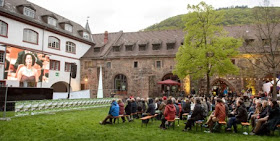 |
|
Mirga Gražinytė-Tyla
with the Deutsche Kammerphilharmonie Bremen at Stadthalle Heidelberg |
CONCERT
Deutsche Kammerphilharmonie Bremen
Stadthalle, Heidelberg
JOSEPHIN MOSCH
The final concert of the Heidelberg Spring Festival on April 30th, 2016, with classics like Beethoven and Mozart on the program, rounded off the festival's twentieth season. The concert at Stadthalle Heidelberg at once marked a first cornerstone in the festival’s history and a new break-off into more centuries of musical springs to come.
Robert Schumann himself celebrated his twentieth birthday in the town by the Neckar – that was in 1830. But just like back then, Heidelberg – as a city of the Lied and of romanticism - remains true to itself, even in 2016: During master classes singers like Thomas Hampson and Brigitte Fassbänder worked with young artists on the development of their voices, whereas pianist Igor Levit and cellist Daniel Müller-Schott, among others, trained scholars in chamber music.
A special surprise awaited the audience of the final concert with the Deutsche Kammerphilharmonie Bremen: The Lithuanian conductor Mirga Gražinytė-Tyla stood in for her diseased colleague Paavo Järvi – a young woman, who, at the age of barely 30, follows in the footsteps of Sir Simon Rattle and Andris Nelson: She was named Music Director of the City of Birmingham Symphony Orchestra from the following season on. Gražinytė-Tyla was a Dudamel Fellow with the Los Angeles Philharmonic in the 2012-13 season, became Assistant Conductor with the Orchestra in 2014, and was promoted to Associate Conductor for the 2016-17 season. Coming to Heidelberg brings her back to an earlier phase of her career – the young musician had served as second Kapellmeister at the Theater und Orchester Heidelberg in the 2011-12 season.
The Deutsche Kammerphilharmonie Bremen has been taking the festival’s stage over the years – and the closing concert was the perfect opportunity for the Director of Deutschland Radio Kultur Hans-Dieter Heimendahl and the President of the Bundestag, the parliament of Germany, Norbert Lammert to present the award ‘Orchestra of the Year’.
Mirga Gražinytė-Tyla with the Deutsche Kammerphilharmonie Bremen at Stadthalle Heidelberg
The musicians of the Hanseatic city made the ‘Spring’ a present of a classical music mix – Beethoven and Mozart. The Deutsche Kammerphilharmonie’s acclaimed interpretation of Beethoven’s orchestral works have won numerous awards for ‘its Beethoven’ recording on the RCA label which critics have described as groundbreaking – with the New York Sun praising the ensemble as: ‘the authoritative Beethoven orchestra of our day’.
As was to be expected, the ‘Beethoven orchestra’ gave an extraordinary performance of his Symphony No. 6 Op. 68, in F major, also known as the Pastoral Symphony, vividly following the composer’s descriptive subtitle ‘memories of country life’. The composer explicitly underlined the programmatic content demanding ‘more (the) expression of feeling than painting’. One could lively imagine the emotions the composer could have had on his walks that inspired him to this wonderful opus. Watching the dynamic of the orchestra and the interaction with its’ conductor, whose body tension and dance-like movements radiated the joy she had making music with such responsive musicians, made the audience even more enthusiastic about the performance.
Opera tunes with Beethoven’s Leonora Overture No.3, Op.72b from Fidelio and the concert aria ‘Ah perfido!’ from Pietro Metastasio’s Achille in Sciro, starring South African soprano Golda Schultz, who trained at Juilliard School in New York and is now part of the Bayerische Staatsoper ensemble in Munich, concluded the Beethoven part. The singer stirringly, dazzlingly interpreted the last aria of the evening - Mozart’s ‘Mi tradì quell’alma ingrata’ from Don Giovanni and delighted both the audience in the concert hall and in the garden of the university’s dining hall where a live broadcasting site had been installed.
Live broadcast of the concert in the garden of the university’s Marstall dining hall
 |
|
Live broadcast of the
concert in the garden of the university’s Marstall dining hall
|
Setting new focuses on tried-and-trusted approaches and finding answers by questioning tradition – this dualistic character appears to be the connecting element of orchestra and festival bringing the four weeks of classical music to a successful conclusion.

No comments:
Post a Comment
Note: Only a member of this blog may post a comment.